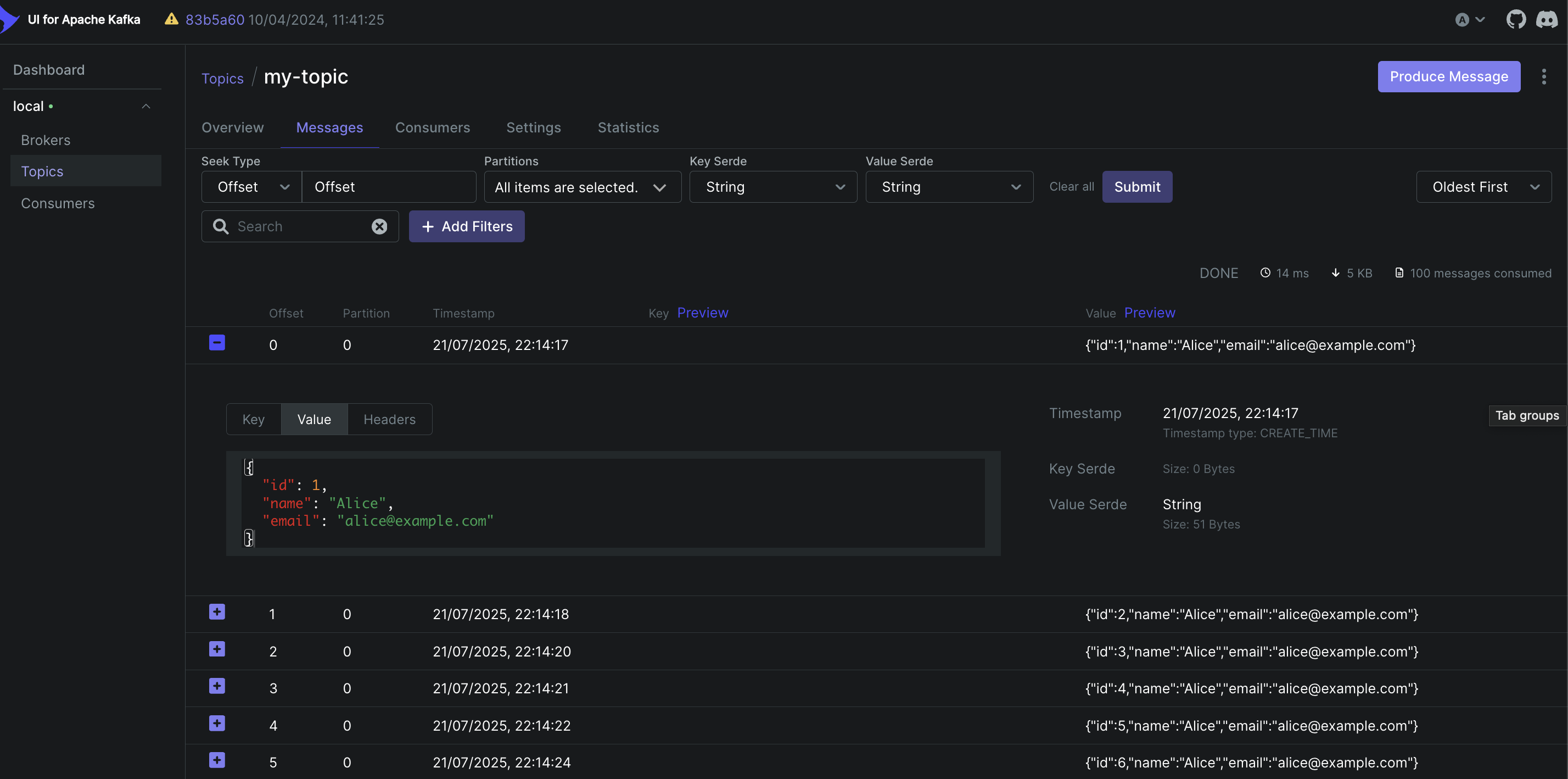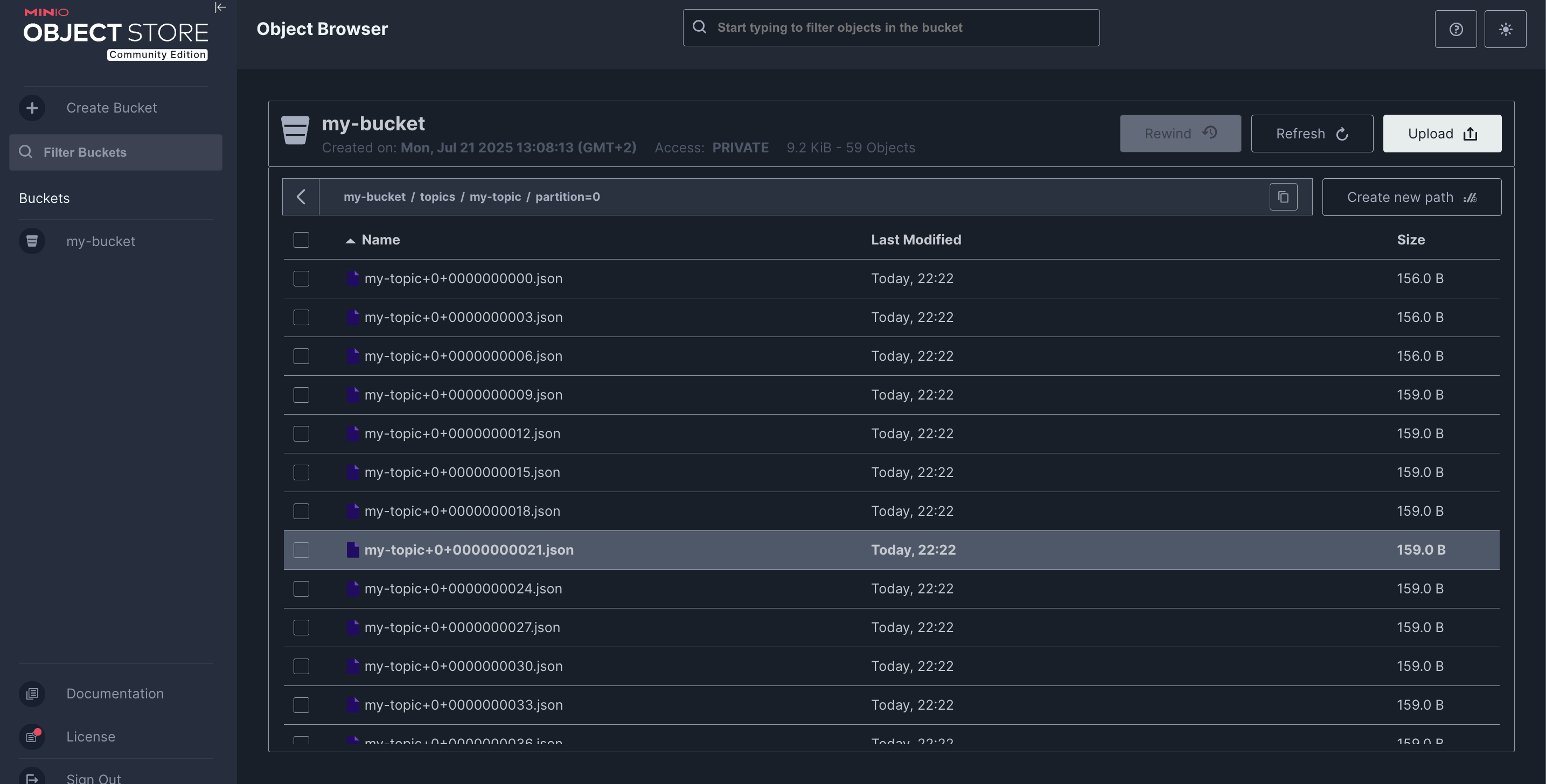Why Kafka Connect?
While you can always write your own Kafka connector to write data from Kafka to S3 or a database using for example confluent-kafka-python, this might be hard to maintain and error prone. Kafka Connect can help you to simplify this task.
In this post we will …
- … set up a local Kafka cluster, S3 storage & Kafka Connect with Docker Compose
- … create a Kafka topic and publish messages to it
- … use Kafka Connect to create an S3 sink connector and write the messages to S3
Run the Example
You can run the full example which is described in this post by executing the following script: It will download the necessary files, start the containers, create a Kafka topic, publish messages, and create an S3 sink connector to write the data to S3:
#!/usr/bin/env zsh
curl https://gist.githubusercontent.com/layandreas/ac955778ad97b55112301e5efaf07e60/raw/5d065594619bd998c7ebb39ce1c91518ef25272c/kafka-connect-self-contained-example.sh > kafka-connect-self-contained-example.sh
zsh kafka-connect-self-contained-example.sh
You can clean up the containers afterwards by running:
#!/usr/bin/env zsh
cd kafka-connect-example
docker compose down -v
Setup
Prerequisite: Download S3 Sink Connector
First we need to download the Confluent Kafka Connect S3 Sink Connector:
#!/usr/bin/env zsh
mkdir kafka-connect-example
cd kafka-connect-example
mkdir kafka-connect-plugins
curl -O https://hub-downloads.confluent.io/api/plugins/confluentinc/kafka-connect-s3/versions/10.6.7/confluentinc-kafka-connect-s3-10.6.7.zip
unzip confluentinc-kafka-connect-s3-10.6.7.zip -d ./kafka-connect-plugins/confluentinc-kafka-connect-jdbc;
This will be mounted into the Kafka Connect container so that it can use the S3 Sink Connector.
Start Containers & Create S3 Bucket
Let’s use our docker-compose.yml to start the containers:
curl https://gist.githubusercontent.com/layandreas/ffb57ec5f102ed0d285c1e8e40838e1a/raw/be4dd51730c931085c58f9c00c761840d188326b/docker-compose.yml > docker-compose.yml
docker compose up
In a separate terminal create the S3 bucket to which we will write our data:
docker exec minio mc alias set local http://localhost:9000 minioadmin minioadmin && docker exec minio mc mb local/my-bucket --ignore-existing
Kafka: Create Topic & Publish Messages
After our containers have started we first need to create a Kafka topic:
#!/usr/bin/env zsh
# Create Kafka topic. This is were we will send our messages to
docker exec kafka kafka-topics --create \
--topic kafka_message \
--bootstrap-server localhost:9092 \
--partitions 1 \
--replication-factor 1
Now we’re ready to publish some messages:
#!/usr/bin/env zsh
# Publish messages to Kafka topic
for i in {1..10}; do
echo "Sending message $i..."
docker exec -i kafka kafka-console-producer --broker-list kafka:9092 --topic my-topic <<EOF
{"id":$i,"name":"Alice","email":"alice@example.com"}
EOF
done
echo "✅ Done sending 10 messages."
You can go to http://localhost:8080/ui/clusters/local/all-topics/my-topic/messages to open the provectus Kafka UI. You should see the messages we ave just published:

Kafka Connect: Create S3 Sink Connector
Next we will create an S3 sink connector:
#!/usr/bin/env zsh
curl -X POST -H "Content-Type: application/json" --data '{
"name": "s3-sink",
"config": {
"connector.class": "io.confluent.connect.s3.S3SinkConnector",
"tasks.max": "1",
"topics": "my-topic",
"s3.bucket.name": "my-bucket",
"s3.region": "us-east-1",
"store.url": "http://minio:9000",
"flush.size": "3",
"storage.class": "io.confluent.connect.s3.storage.S3Storage",
"format.class": "io.confluent.connect.s3.format.json.JsonFormat",
"schema.compatibility": "NONE",
"aws.access.key.id": "minioadmin",
"aws.secret.access.key": "minioadmin",
"key.converter": "org.apache.kafka.connect.storage.StringConverter",
"value.converter": "org.apache.kafka.connect.json.JsonConverter",
"value.converter.schemas.enable": "false",
"key.converter.schemas.enable": "false"
}
}' http://localhost:8083/connectors
The connector will read messages from the my-topic topic and write them to the minio S3 bucket my-bucket in JSON format. The connector will flush data to S3 every 3 messages.
Check the Results
You can go to the minio web interface at http://localhost:9001/browser/my-bucket and log in with minioadmin as both username and password. You should see the bucket my-bucket with the files loaded into it by Kafka Connect:

Each file will contain 3 messages in JSON Lines format:
{"name":"Alice","id":70,"email":"alice@example.com"}
{"name":"Alice","id":71,"email":"alice@example.com"}
{"name":"Alice","id":72,"email":"alice@example.com"}
Full Docker Compose File
docker-compose.yml:
version: "3.8"
services:
zookeeper:
image: confluentinc/cp-zookeeper:7.4.0
container_name: zookeeper
environment:
ZOOKEEPER_CLIENT_PORT: 2181
ZOOKEEPER_TICK_TIME: 2000
kafka:
image: confluentinc/cp-kafka:7.4.0
container_name: kafka
ports:
- "9092:9092"
environment:
KAFKA_BROKER_ID: 1
KAFKA_ZOOKEEPER_CONNECT: "zookeeper:2181"
KAFKA_ADVERTISED_LISTENERS: PLAINTEXT://kafka:9092
KAFKA_OFFSETS_TOPIC_REPLICATION_FACTOR: 1
depends_on:
- zookeeper
minio:
image: minio/minio
container_name: minio
ports:
- "9000:9000"
- "9001:9001"
environment:
MINIO_ROOT_USER: minioadmin
MINIO_ROOT_PASSWORD: minioadmin
command: server /data --console-address ":9001"
volumes:
- minio-data:/data
kafka-connect:
image: confluentinc/cp-kafka-connect:7.4.0
container_name: kafka-connect
ports:
- "8083:8083"
environment:
CONNECT_REST_ADVERTISED_HOST_NAME: kafka-connect
CONNECT_BOOTSTRAP_SERVERS: kafka:9092
CONNECT_REST_PORT: 8083
CONNECT_GROUP_ID: "connect-cluster"
CONNECT_CONFIG_STORAGE_TOPIC: "connect-configs"
CONNECT_OFFSET_STORAGE_TOPIC: "connect-offsets"
CONNECT_STATUS_STORAGE_TOPIC: "connect-status"
CONNECT_KEY_CONVERTER: org.apache.kafka.connect.json.JsonConverter
CONNECT_VALUE_CONVERTER: org.apache.kafka.connect.json.JsonConverter
CONNECT_INTERNAL_KEY_CONVERTER: org.apache.kafka.connect.json.JsonConverter
CONNECT_INTERNAL_VALUE_CONVERTER: org.apache.kafka.connect.json.JsonConverter
CONNECT_PLUGIN_PATH: /usr/share/java,/etc/kafka-connect/jars
CONNECT_LOG4J_LOGGERS: org.apache.kafka.connect.runtime.rest=WARN,org.reflections=ERROR
CONNECT_CONFIG_STORAGE_REPLICATION_FACTOR: 1
CONNECT_OFFSET_STORAGE_REPLICATION_FACTOR: 1
CONNECT_STATUS_STORAGE_REPLICATION_FACTOR: 1
# S3 / MinIO access config (can be passed to the connector config)
AWS_ACCESS_KEY_ID: minioadmin
AWS_SECRET_ACCESS_KEY: minioadmin
AWS_ENDPOINT_OVERRIDE: http://minio:9000
# This will help the S3 connector connect to MinIO properly
volumes:
- ./kafka-connect-plugins:/etc/kafka-connect/jars
depends_on:
- kafka
- minio
kafka-ui:
image: provectuslabs/kafka-ui:latest
container_name: kafka-ui
ports:
- "8080:8080"
environment:
- KAFKA_CLUSTERS_0_NAME=local
- KAFKA_CLUSTERS_0_BOOTSTRAPSERVERS=kafka:9092
- KAFKA_CLUSTERS_0_ZOOKEEPER=zookeeper:2181
depends_on:
- kafka
- zookeeper
volumes:
minio-data: